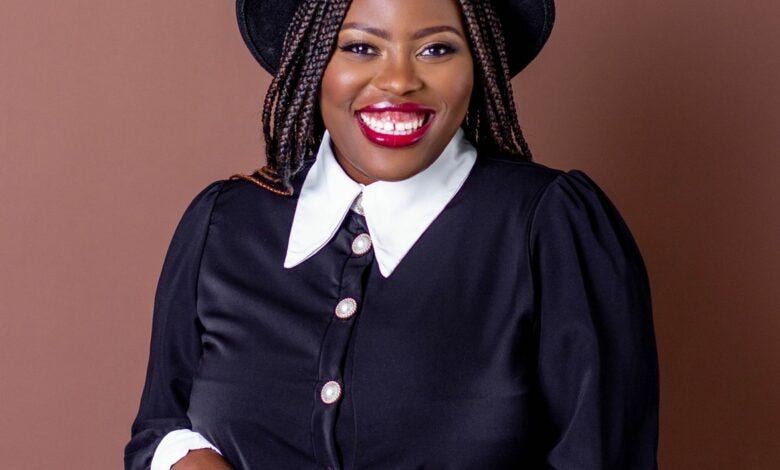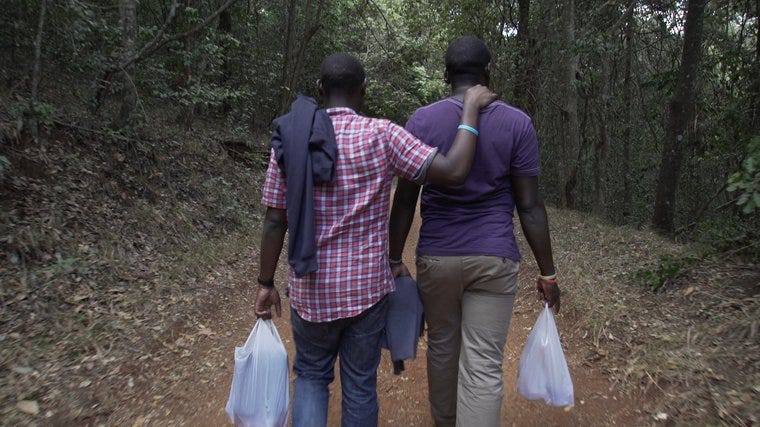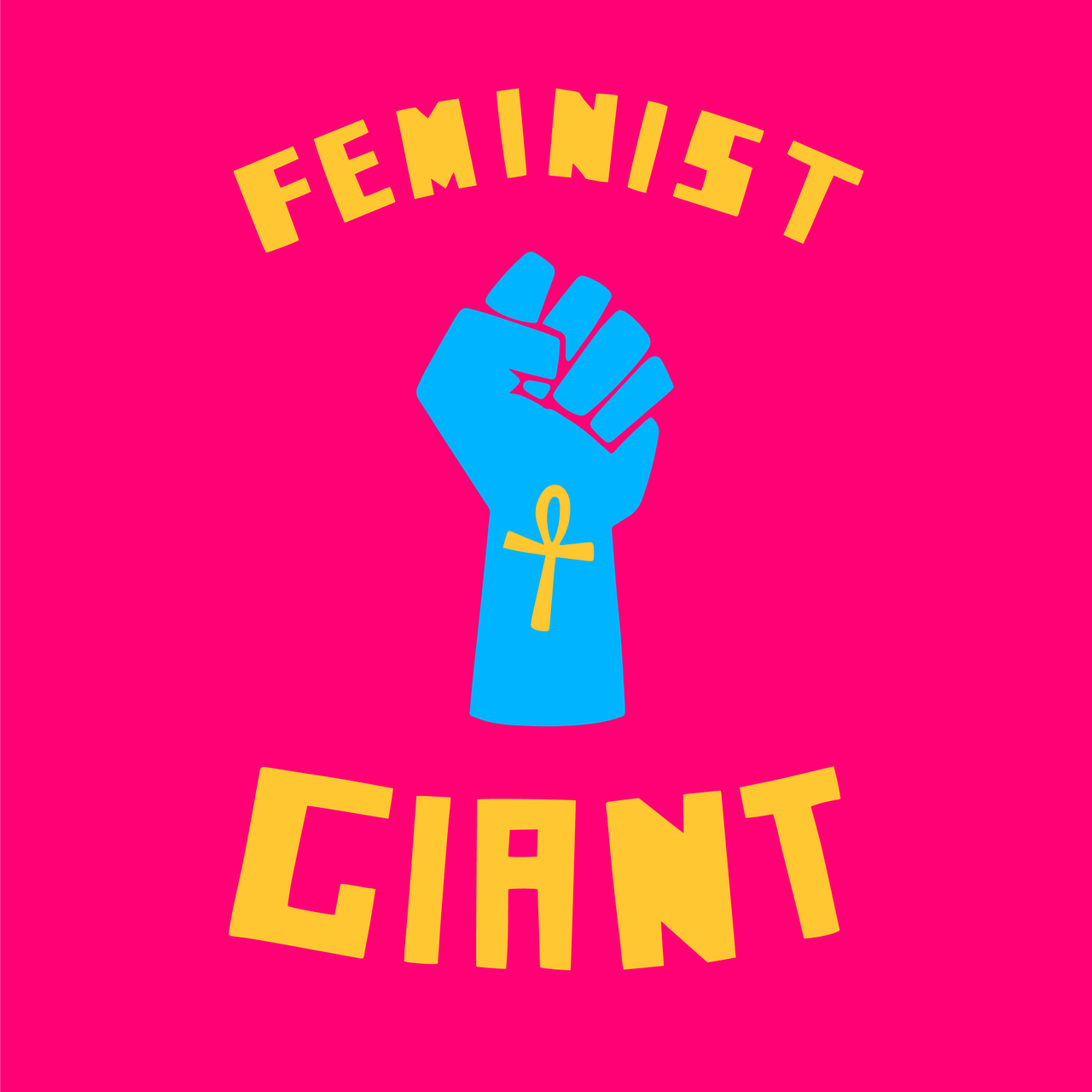Global Roundup: South Africa Minister of Menstruation, Trans People Tell Stories of Abortion, Nicaraguan Migrant Women in Costa Rica, India Trans-Disabled Activist, Queer Kenyan Film Banned
Curated by FG contributor Samiha Hossain
Photo via Soweto Urban
Candice Chirwa, popularly known as the Minister of Menstruation, is a social activist who has made efforts to educate youth on menstrual education. She believes period poverty needs urgent intervention.
In order to #BreakTheBias, I want to imagine a world where period dignity exists. I am going to tell you how a biological function has a major impact on gender inequality. We need to understand that period poverty is an important global issue that requires important attention. Period poverty is the lack of access to sanitary products, menstrual health education, toilets, hand washing facilities and waste management. - Candice Chirwa
Chirwa says she was fortunate enough to have what she needed to manage her period in a safe and hygienic way as a young girl. She was also able to have a conversation with her mother at the age of 10 and go to a school that covered menstruation from a biological point of view. However, Chirwa is aware that her experience is a luxury that many young menstruators do not share. It is estimated that in South Africa, up to 3.7 million girls do not have access or cannot afford to buy sanitary products, many of them resort to staying at home. It is also estimated that 30% of South African school girls miss school when menstruating due to the cost of period products. Chirwa notes that missing school ultimately impacts young menstruators’ education.
Without a full education, the gender inequality gap widens which limits life opportunities. Gender inequality, extreme poverty and harmful traditions can all make menstruation fraught with deprivation and stigma. All around the world girls, women, transgender and intersex people suffer from the stigma of menstruation through cultural taboos, discrimination and the inability to afford sanitary products. - Candice Chirwa
Chirwa has been educating youth on menstrual education through her award winning NGO, QRATE. However, she believes more needs to be done especially on the state level. She said that the government should play an important role in the destigmatization of menstruation. Some of her suggestions include having a dispenser available in bathrooms in health facilities in public institutions in South Africa, requiring businesses to have a Corporate Social Investment project that tackles period poverty, and providing better puberty, sex and period education for young people in schools. Chirwa also recognizes the power individuals have in changing cultural norms.
Breaking the bias around talking openly about periods starts with each and every one of us. We can break the bias in our schools, workplaces, churches and social places. We can break the bias in ensuring that the next generation of menstruators can live and exist in a period positive world. - Candice Chirwa
TRANSLASH MEDIA via Teen Vogue
CW: sexual assault and suicide
TransLash Media has partnered with the National LGBTQ Task Force to launch a three-part video series called “Trans Bodies, Trans Choices,” in which transgender people speak out about their abortion experiences. Each video will feature a trans person telling their own abortion story, highlighting the variety of experiences trans people have, as well as the challenges they may face navigating a system set up largely for cisgender people.
This issue is not merely philosophical for our community. Trans people have babies, need general access to reproductive medical services, and have abortions. However, we do so within a healthcare system that is often hostile to our very existence. By not including trans people in this fight, the overall reproductive justice is smaller and weaker. - Imara Jones, founder and CEO of TransLash Media
The series started with a video titled “My Abortion Saved My Life,” in which Cazembe Murphy Jackson, a Black trans activist, explains how having an abortion after he became pregnant when he was sexually assaulted in college prevented him from attempting suicide. Today, TransLash Media will share "I Didn’t Think I’d Make It,” the story of Stann's abortion that helped them access more trans-affirming care. The series will finish with “Trans Bodies, Trans Choices,” Jack's abortion story that explores transphobia in healthcare, and how they're now lobbying for more trans-inclusive training for abortion providers.
One of the recent, rare studies on the prevalence of abortion in trans and gender non-confirming people asked trans people who'd had abortions how these services could be more inclusive. According to the survey, people frequently indicated that providers could use gender-neutral language, have gender-neutral intake forms, and have better privacy practices. In addition, a survey by The Center for American Progress found that transgender people are “consistently and systemically underserved” by the medical system. Ultimately, discrimination by medical professionals leads to trans people seeking less care.
The path towards justice includes a world where Trans people’s reproductive decisions, including abortion, takes place in thriving communities that are safe, affirming, and affordable. This will be a fight for the long haul, and it will take all of us. - Adaku Utah, organizing director at National Network of Abortion
Via Confidencial
For decades, many Nicaraguans have had to migrate to Costa Rica for political or economic reasons. A 2018 study by the Inter-American Development Bank (IDB) revealed that since 2010, women have made up a little over half of the Nicaraguan immigrant population in Costa Rica. Confidencial spoke to three such women about the challenges they face as immigrants in Costa Rica.
Wendy Quintero Chavez is a journalist and human rights advocate. In 2018, she signed on with the Nicaraguan Center for Human Rights (Cenidh) to assist victims of the repression being unleashed by the Ortega-Murillo regime. But the organization was abruptly stripped of its legal status and outlawed. Chavez was forced to leave Nicaragua for Costa Rica to safeguard her life and the safety of her family. After several months of exile, and amid the uncertainty of finding a new path, she joined the Nunca Mas [Never again] Human Rights Collective, an organization founded by Nicaraguan human rights advocates exiled in Costa Rica. However, Chavez recognized that not all women Nicaraguan immigrants have the kind of opportunity she did. She notes that the mutual support and solidarity among women immigrants in Costa Rica is key to making more visible the barriers they all face, and to confronting the difficulties.
The face of this struggle is a woman’s face, because when we women go into exile we don’t just leave by ourselves, but we drag our sons and daughters with us, because they’re part of us. - Wendy Quintero Chavez
Eveling Cuningham, 28, immigrated to Costa Rica with her children in 2018, due to the political crisis in Nicaragua. She opened a small business selling Nicaraguan food as it was difficult finding work in a new country. At the beginning of 2020, she formally launched her business, “Eve’s Gourmet,” which she says has been well received by both Costa Ricans and Nicaraguans. Cuningham is part of the Pinolera Women’s Fair, a network of 20 Nicaraguan immigrant women in Costa Rica who seek ways to strengthen their business initiatives.
Singer and activist Olguita Acuña also arrived in Costa Rica in 2018. Music has become an essential source of income for her to survive, but she notes that she has encountered discrimination for being a woman, for being diverse and for being a singer.
I took a look at all the resources I had at hand, and what I had was the ukulele. So, I took to singing on the street, in bars, and little by little people began to know me…At first, they saw me more as a decoration in the singing world, instead of a person who could have a voice, until they gave me the opportunity to do so. - Olguita Acuña
Acuña says music has also become her medium for denouncing the discrimination that exists against immigrant women, and shining a spotlight on her important role in society. She believes in women empowering each other to highlight their efforts and struggles.
Via Feminism in India
Kiran Nayak. B, 34, is a trans disabled person and an award winning social activist. Kiran, who has an orthopaedic disability, focuses on building networks for trans persons and improving their access to mental health and sexual and reproductive health services in India. In 2020, he founded two groups: Karnataka Vikalachetanara Sanghatane (a network of people living with physical, virtual and all other forms of disabilities across Karnataka) and Society for Transmen Action and Rights group. Feminism in India interviewed Kiran to highlight the lack of accessibility for queer disabled people within the healthcare system.
Kiran says that while he feels he can talk to healthcare professionals about his disability “rather easily,” talking about his transness is “very, very difficult,” leading to even more psychological and physical issues. He notes that private hospitals are easier to navigate but they are expensive and accessible to very few people. In addition, medicines such as testosterone that are needed for trans people are not available locally and can only be accessed in cities.
Since government hospitals are terrible and so many of us cannot afford private hospitals is another reason why we have lots of health issues. The very first question they ask, “Are you male or female?”. That’s how it starts. - Kiran Nayak. B
Many government hospitals are not accessible according to Kiran, as they do not have a ramp for example. Accessibility to the toilet is another major issue – he says that holding in urine causes kidney problems in a lot of trans men and he often has to get a kidney treatment every year. Kiran also notes that gynecologists often ask personal and intimate questions that are irrelevant to the medical issues. Overall, he says that healthcare professionals do not practice gender-affirming care.
As far as my experience goes, government hospitals definitely have to change. They should be provided with awareness sessions on trans men and trans women and all other marginalized genders and sexualities. - Kiran Nayak. B
Kiran emphasizes the need for healthcare professionals to be properly trained before they are allowed to treat trans people. He says that the COVID-19 pandemic has only worsened the issues his community faces, such as the lack of people examining the implications of the COVID-19 vaccine on trans people who are on hormones. Kiran firmly believes in the bodily autonomy of trans-disabled people and the need for doctors to listen to them.
‘I Am Samuel’ follows the lives of Samuel Asilikwa and his partner, Alex, two gay working-class Kenyan men. I Am Samuel. All rights reserved via Open Democracy
“I am Samuel” is a gay Kenyan documentary that has been banned in Kenya, but its filmmakers are finding creative ways to bypass the censors and get the voices of their subjects heard. The 2020 documentary directed by Peter Murimi depicts two lovers in Nairobi who face persecution and rejection – as well as finding joy in their queer community and rebuilding relationships with their family. The lovers are Samuel Asilikwa and Alex, two gay working-class Kenyan men.
In Kenya, privilege buys you security. So it’s much better coming out as queer and rich rather than queer and poor. The voice of the lower class was missing and it was so important to get that narrative out – not just for Samuel and the general public’s information, but more so for queer people who have never seen themselves on a screen or as part of Kenya. - Peter Murimi
In September 2021, the Kenya Film and Classification Board (KFCB) blocked the screening of the film, issuing a statement calling it a “clear and deliberate attempt by the producer to promote same-sex marriage as an acceptable way of life.” Since the ban does not extend to other forms of media, Murimi has been able to speak about the film on podcasts that can be listened to worldwide. The filmmakers have also put together a printed discussion guide to encourage audiences to have impactful conversations about the film.
Same-sex intimacy is criminalized in Kenya and this is not the first time the KFCB has banned a film with LGBTQ+ themes. In 2018, “Rafiki,” the first Kenyan film to debut at the Cannes Film Festival, was similarly banned by the regulator for depicting a fictional story of a lesbian couple.
The documentary, which is filmed in Swahili with English subtitles, has gone on to be screened at more than 25 festivals worldwide. However, Murimi believes it is “much more important for Africans to watch this film than it is for people worldwide,…especially as it is a narrative that is rarely told.” He refuses to let the ban stop him and has been dodging the censorship in other ways secretly behind the scenes. In addition, the LGBTQ+ community and its allies have been discussing and supporting the film through the hashtag #IAmSamuel on social media.
Samiha Hossain (she/her) is a student at the University of Ottawa. She has experience working with survivors of sexual violence in her community, as well as conducting research on gender-based violence. A lot of her time is spent learning about and critically engaging with intersectional feminism, transformative justice and disability justice.
Samiha firmly believes in the power of connecting with people and listening to their stories to create solidarity and heal as a community. She refuses to let anyone thwart her imagination when it comes to envisioning a radically different future full of care webs, nurturance and collective liberation.







